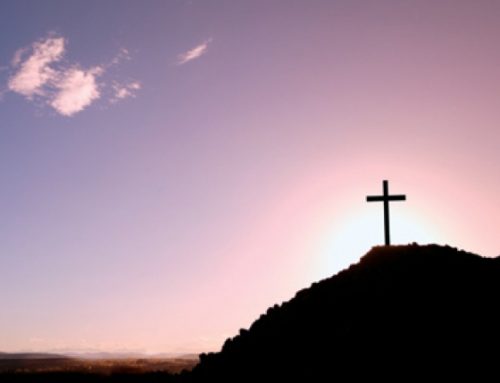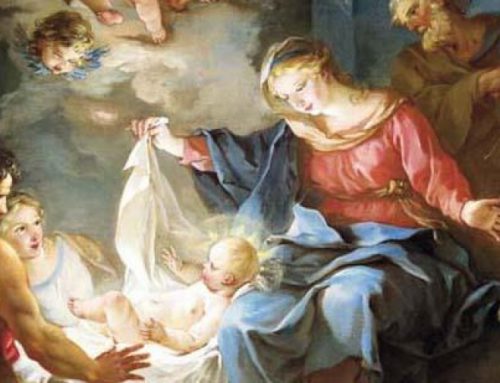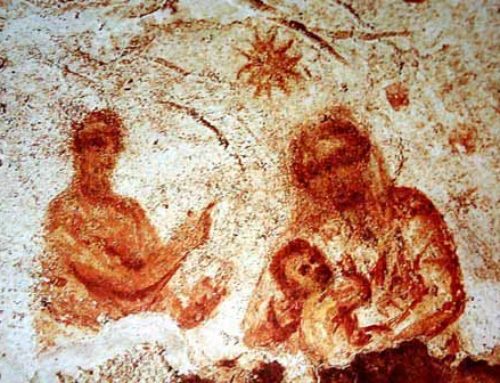In the accepted order of the books of the New Testament the fifth book is called The Acts of the Apostles (praxeis Apostolon). Some have thought that the title of the book was affixed by the author himself. This is the opinion of Cornely in his “Introduction to the Books of the New Testament” (second edition, page 315). It seems far more probable, however, that the name was subsequently attached to the book just as the headings of the several Gospels were affixed to them. In fact, the name, Acts of the Apostles, does not precisely convey the idea of the contents of the book; and such a title would scarcely be given to the work by the author himself.
 In the accepted order of the books of the New Testament the fifth book is called The Acts of the Apostles (praxeis Apostolon). Some have thought that the title of the book was affixed by the author himself. This is the opinion of Cornely in his “Introduction to the Books of the New Testament” (second edition, page 315). It seems far more probable, however, that the name was subsequently attached to the book just as the headings of the several Gospels were affixed to them. In fact, the name, Acts of the Apostles, does not precisely convey the idea of the contents of the book; and such a title would scarcely be given to the work by the author himself.
In the accepted order of the books of the New Testament the fifth book is called The Acts of the Apostles (praxeis Apostolon). Some have thought that the title of the book was affixed by the author himself. This is the opinion of Cornely in his “Introduction to the Books of the New Testament” (second edition, page 315). It seems far more probable, however, that the name was subsequently attached to the book just as the headings of the several Gospels were affixed to them. In fact, the name, Acts of the Apostles, does not precisely convey the idea of the contents of the book; and such a title would scarcely be given to the work by the author himself.
The book does not contain the Acts of all the Apostles, neither does it contain all the acts of any Apostle. It opens with a brief notice of the forty days succeeding the Resurrection of Christ during which He appeared to the Apostles, “speaking the things concerning the Kingdom of God”. The promise of the Holy Ghost and the Ascension of Christ are then briefly recorded.St. Peter advises that a successor be chosen in the place of Judas Iscariot, and Matthias is chosen by lot. On Pentecost theHoly Ghost descends on the Apostles, and confers on them the gift of tongues. To the wondering witnesses St. Peterexplains the great miracle, proving that it is the power of Jesus Christ that is operating. By that great discourse many wereconverted to the religion of Christ and were baptized, “and there were added unto them in that day about three thousandsouls”. This was the beginning of the Judeo-Christian Church. “And the Lord added to them day by day those that were being saved.” Peter and John heal a man, lame from his mother’s womb, at the door of the Temple which is called Beautiful. The people are filled with wonder and amazement at the miracle and run together unto Peter and John in the portico that was called Solomon’s. Peter again preaches Jesus Christ, asserting that by faith in the name of Jesus the lame man had been made strong. “And many of them that heard the word believed”, and the number of the men came to be about five thousand. But now “the priests, and the prefect of the Temple and the Sadducees came upon them, being sorely troubled because they taught the people, and proclaimed in Jesus the resurrection from the dead. And they laid hands on them, and put them in prison unto the morrow.” On the morrow Peter and John are summoned before rulers, elders, and scribes, among whom were present Annas, the High-Priest, Caiphas, and as many as were of the kindred of the High-Priest. And when they had set Peter and John in the midst they inquired: “By what power, or in want name have ye done this?” Then Peter, filled with the Holy Ghost, answering gave utterance to one of the most sublime professions of the Christian faith ever made by man: “Be it known unto you all, and to all the people of Israel, that in the name of Jesus Christ of Nazareth, whom ye crucified, whom God raised from the dead, in this name doth this man stand here before you whole. He [Jesus] is thestone which was set at naught by you the builders, which was made the head of the corner [Isaiah 28:16; Matthew 21:42]. And in no other is there salvation: For neither is there any other name under Heaven, that is given among men, wherein we must be saved.” The members of the council were brought face to face with the most positive evidence of the truth of theChristian religion. They command the two Apostles to go aside out of the council, and then they confer among themselves, saying “What shall we do with these men? For that indeed a notable miracle hath been wrought through them, is manifest to all that dwell in Jerusalem; and we cannot deny it”. Here is one of the splendid instances of that great cumulus of evidence upon which the certitude of the Christian Faith rests. A bitterly hostile council of the chief Jews of Jerusalem is obliged to declare that a notable miracle had been wrought, which it cannot deny, and which is manifest to all that dwell in Jerusalem.
With dreadful malice the council attempts to restrain the great movement of Christianity. They threaten the Apostles, and charge them not to speak at all or teach in the name of Jesus; Peter and John contemn the threat, calling upon the councilto judge whether it be right to hearken unto the council rather than unto God. The members of the council could not inflict punishment upon the two Apostles, on account of the people, who glorified God on account of the great miracle. Peter andJohn, being freed from custody, return to the other Apostles. They all give glory to God and pray for boldness to speak the word of God. After the prayer the place shakes, and they are filled with the Holy Ghost.
The fervour of the Christians at that epoch was very great. They were of one heart and soul; they had all things in common. As many as were possessors of lands or houses sold them and delivered the price to the Apostles, and this money was distributed as anyone had need. But a certain Ananias, with Saphira his wife, sold a possession and kept back part of the price, the wife being accessory to the deed. St. Peter is inspired by the Holy Ghost to know the deception, and rebukes Ananias for the lie to the Holy Ghost. At the rebuke the man falls dead. Saphira, coming up afterwards, and knowing nothing of the death of her husband, is interrogated by St. Peter regarding the transaction. She also keeps back a part of the price, and lyingly asserts that the full price has been brought to the Apostles. St. Peter rebukes her, and she also falls dead at his words. The multitude saw in the death of Ananias and Saphira God’s punishment, and great fear came upon all. This miracleof God’s punishment of sin also confirmed the faith of those that believed and drew disciples to them. At this stage of thelife of the Church miracles were necessary to attest the truth of her teaching, and the power of miracles was abundantly bestowed upon the Apostles. These miracles are not reviewed in detail in Acts, but it is stated: “And by the hands of theapostles were many signs and wonders wrought among the people” (Acts 5:12). Multitudes both of men and women were added to the Christian community. The people of Jerusalem carried out the sick and laid them on beds and couches in the streets that the shadow of St. Peter might fall on them. They brought the sick from the cities round about Jerusalem, and every one was healed.
The most powerful sect among the Jews at this epoch were the Sadducees. They were especially opposed to the Christian religion on account of the doctrine of the resurrection of the dead. The cardinal truth of the Apostles’ teaching was: LifeEverlasting through Jesus, Who was crucified for our sins, and Who is risen from the dead. The High-Priest Annas favored the Sadducees, and his son Ananus. who afterwards became High-Priest, was a Sadducee (Josephus, Antiq., XX, viii). These fierce sectaries made with Annas and Caiphas common cause against the Apostles of Christ, and cast them again intoprison. The Acts leaves us in no doubt as to the motive that inspired the High-Priest and the sectaries: “They were filled with jealousy”. The religious leaders of the Old Law saw their influence with the people waning before the power which worked in the Apostles of Christ. An angel of the Lord by night opened the prison doors, and brought the Apostles out, and bade them go and preach in the Temple. The council of the Jews, not finding Peter and John in the prison, and learning of their miraculous deliverance, are much perplexed. On information that they are teaching in the Temple, they send and take them, but without violence, fearing the people. It is evident throughout that the common people are disposed to follow theApostles; the opposition comes from the priests and the classes, most of the latter being Sadducees. The council accuses the Apostles that, contrary to its former injunction not to teach in Christ’s name, they had filled Jerusalem with Christ’steaching. Peter’s defence is that they must obey God rather than men. He then boldly reiterates the doctrine of theRedemption and of the Resurrection. The council is minded to kill the Apostles. At this point Gamaliel, a Pharisee, a doctor of the Jewish law, held in honour of all the people, arises in the council in defence of the Apostles. He cites precedents to provethat, if the New Teaching be of men, it will be overthrown; and if it be of God, it will be impossible to overthrow it.Gamaliel’s counsel prevails, and the council calls the Apostles, beats them, and lets them go, charging them not to speak in the name of Jesus. But the Apostles departed, rejoicing that they were counted worthy to suffer dishonour for the Name. And every day, in the Temple and privately they ceased not to teach and to preach Jesus the Christ.
A murmuring having arisen of the Grecian Jews, that their widows were neglected in the daily ministration, the Apostles, deeming it unworthy that they should forsake the word of God and serve tables, appoint seven deacons to minister. Chief among the deacons was Stephen, a man full of the Holy Spirit. He wrought great signs and wonders among the people. The anti-Christian Jews endeavour to resist him, but are not able to withstand the wisdom and the spirit by which he speaks. They suborn witnesses to testify that he has spoken against Moses and the Temple. Stephen is seized and brought into thecouncil. False witnesses testify that they have heard Stephen say that “this Jesus of Nazareth shall destroy this place, and shall change the customs which Moses delivered to us”. All who sat in the council saw Stephen’s face, as it had been the face of an angel. He makes a defence, in which he reviews the chief events in the first covenant, and its relation to the New Law. They rush upon Stephen, drag him out of the city, and stone him to death. And he kneels down and prays: “Lord, lay not this sin to their charge”, and dies. Beginning with the martyrdom of Stephen, a great persecution arose against theChurch at Jerusalem; all were scattered abroad throughout Judea and Samaria, except the Apostles. The leader of thepersecution was Saul, afterwards to become the great St. Paul, the Apostle of the Gentiles. The deacon Philip first preaches in Samaria with great fruit. Like all the preachers of the first days of the Church, Philip confirms his preaching by greatmiracles. Peter and John go up to Samaria and confirm the converts whom Philip had made. Philip, commanded by an angel, goes down the road from Jerusalem to Gaza, and on the way converts and baptizes the eunuch of Candace Queen ofEthiopia. Philip is thence transported by Divine power to Azotus and preaches to all the coast cities until be comes toCæsarea.
Saul, breathing threatening and slaughter against the disciples of the Lord, sets out for Damascus to apprehend anyChristians whom he may find there. As he draws near to Damascus, the Lord Jesus speaks to him out of the heavens andconverts him. St. Paul is baptized by Ananias at Damascus, and straightway for some days abides there, preaching in thesynagogues that Jesus Christ is the Son of God. He withdraws into Arabia; again returns to Damascus; and after three years be goes up to Jerusalem. At Jerusalem Paul is at first distrusted by the disciples of Jesus; but after Barnabas narrates to them Paul’s marvellous conversion, they receive Paul, and he preaches boldly in the name of Jesus, disputing especially against the Grecian Jews. They plot to kill him; but the Christians bring Paul down to Cæsarea, and send him forth to Tarsus, his native city.
At this epoch Acts describes the Church in Judea, Samaria, and Galilee as “at peace, being builded up, and walking in thefear of the Lord, and by the strength of the Holy Ghost it was multiplied”. Peter now goes throughout all parts comforting thefaithful. At Lydda he heals the palsied Æneas; and at Joppa he raises the pious widow Tabitha (Greek, Dorcas) from the dead. These miracles still more confirm the faith in Jesus Christ. At Joppa Peter has the great vision of the sheet let down from Heaven containing all manner of animals, of which he, being in a trance, is commanded to kill and eat. Peter refuses, on the ground that he cannot eat that which is common and unclean. Whereupon it is made known to him from God, thatGod has cleansed what was before to the Jew unclean. This great vision, revealed three times, was the manifestation of thewill of Heaven that the ritual law of the Jews should cease; and that henceforth salvation should be offered without distinction to Jew and Gentile. The meaning of the vision is unfolded to Peter, when he is commanded by an angel to go toCæsarea, to the Gentile centurion Cornelius, whose messengers were even then come to fetch him. He goes, and hears fromCornelius also the centurion’s own vision. He preaches to him and to all assembled; the Holy Ghost descends upon them, and Peter commands that they be baptized. Returning to Jerusalem, the Jews contend with Peter that he has gone in to menuncircumcised, and eaten with them. He expounds to them his vision at Joppa, and also the vision of Cornelius, wherein the latter was commanded by an angel to send and fetch Peter from Joppa, that he might receive from Peter the Gospel. TheJews acquiesce, glorifying God, and declaring that “unto the Gentiles also hath God granted repentance unto life”. Those who had been scattered abroad from Jerusalem at the time of Stephen’s martyrdom had travailed as far as Phoenicia,Cyprus, and Antioch preaching Christ; but they preached to none save the Jews. The calling of the Gentiles was not yet understood by them. But now some converts from Cyprus and Cyrene come up to Antioch, and preach the Gospel to theGentiles. A great number believe, and turn to the Lord. The report of the work at Antioch comes to the ears of the Church inJerusalem; and they send Barnabas, “a good man full of the Holy Ghost and of faith”, to them. He takes Paul from Tarsus, and they both dwell at Antioch a whole year, and teach many people. The disciples of Christ are called Christians first atAntioch.
The rest of Acts narrates the persecution of the Christians by Herod Agrippa; the mission of Paul and Barnabas from Antiochby the Holy Ghost, to preach to the Gentile nations; the labours of Paul and Barnabas in Cyprus and in Asia Minor, their return to Antioch; the dissension at Antioch concerning circumcision; the journey of Paul and Barnabas to Jerusalem, the decision of the Apostolic Council of Jerusalem, the separation of Paul from Barnabas, in whose stead he takes Silas, or Silvanus; Paul’s visit to his Asiatic Churches, his foundation of the Church at Philippi; Paul’s sufferings for Jesus Christ;Paul’s visit to Athens, his foundation of the churches of Corinth and of Ephesus; Paul’s return to Jerusalem, his persecutionby the Jews; Paul’s imprisonment at Cæsarea; Paul’s appeal to Cæsar, his voyage to Rome; the shipwreck; Paul’s arrival atRome, and the manner of his life there. We see therefore that a more proper title of this book would be “The Beginnings of the Christian Religion”. It is an artistic whole, the fullest history which we possess of the manner in which the Church developed.
New Advent







Leave A Comment
You must be logged in to post a comment.